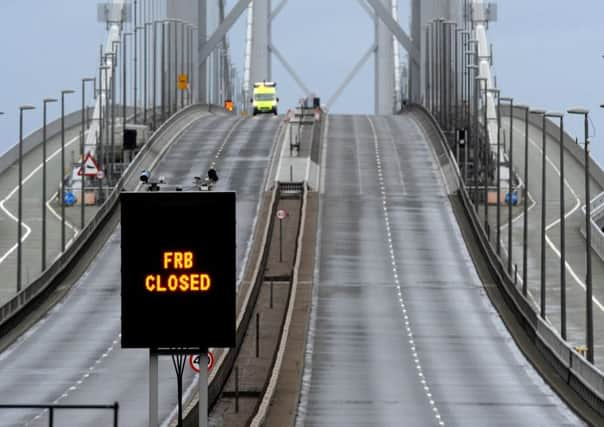Forth Bridge closure '˜changes commute forever'


Research into the three-week closure of the Forth Road Bridge last December found a small but significant proportion of commuters changed the way they travelled after the shutdown.
The authors of the study, who included Professor Iain Docherty of the University of Glasgow, said the potential for influencing travel from such disruption was significant because incidents were likely to become more frequent, especially from extreme weather such as flooding.
Advertisement
Hide AdAdvertisement
Hide AdCommuters travelled to work on one in eight fewer days during the bridge closure, and others changed when they travelled, the research showed.
This “disappearing traffic” was because more people worked from home or used flexitime to complete work that would normally take them five days in four.
A poll of nearly 1,000 commuters found more than one in 12 were likely to travel less frequently, with one in 14 planning to change when they travelled.
The vast majority said they had the option to work from home or flexitime.
Advertisement
Hide AdAdvertisement
Hide AdHowever only just over one third of employers were happy with home working, and just over half with flexitime.
The sudden closure of the bridge, which carries nearly 70,000 vehicles a day, because of a structural fault, increased Fife-Edinburgh journeys by 30-40 minutes via the Kincardine Bridge.
Nearly half of car and bus travellers switched to trains and there was a significant reduction in leisure trips. Professor Greg Marsden, of Leeds University, one of the study’s authors, said: “There will be more major transport disruptions in the years ahead.
“The key responses are to reduce the amount of travel that needs to happen by stretching tolerance to more flexible and remote working, and to provide better information about when best to travel and what to expect.
Advertisement
Hide AdAdvertisement
Hide Ad“If it is more normal to exercise a bit more flexibility each week, it is easier for the business to adapt if there is a major event, incident, snow or flooding when these things happen.
“Even for those that can’t work from home or have no flexibility, it is essential to encourage as much change from those who can, to keep overcrowding and congestion levels down when critical links are not available to travellers.”
Sustainable transport campaigners Transform Scotland said the Scottish Government should have been better prepared.
Director Colin Howden said: “At the time of the bridge closure, the government moved quickly to put in place extra rail services as well as encouraging bus use and car sharing. But it shouldn’t have taken the unexpected closure of the bridge to get ministers to spring into action. It’s clear from this research there is ample opportunity for cutting car use. However, government is not investing adequately in measures that will cut road traffic levels.”
Advertisement
Hide AdAdvertisement
Hide AdA spokeswoman for the Scottish Government’s Transport Scotland said: “Encouraging behaviour change and flexibility is a part of any successful response to disruptive events, and this was evidenced by the number of car and coach users who shifted to rail during the bridge closure.
“Car is often the default option when there may be better public transport options.
“Significant events like the bridge closure, or more positive ones like the Commonwealth Games, prompt people to rethink, re-time, reroute or re-mode their journeys which can prove to be a welcome change and, in some instances, a long-lasting one.
“We would encourage all businesses and commuters to plan ahead not only for the norm, but also for the unexpected.”